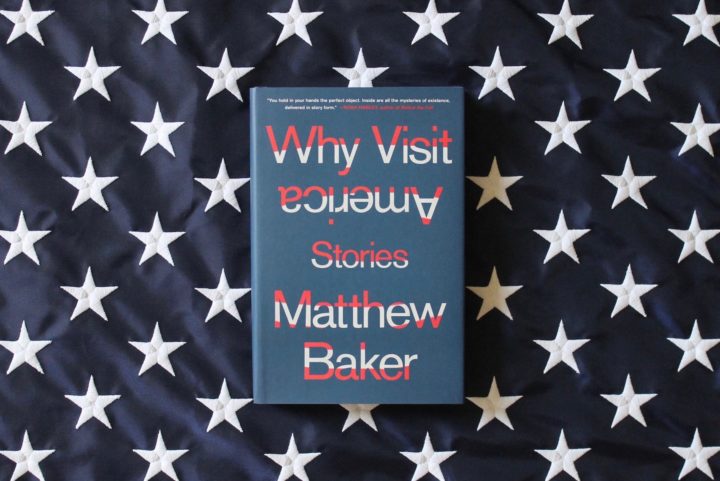INTERVIEW
Once I read the short story “Life Sentence” in Lightspeed Magazine, I decided to save it to my collections of short stories I should revisit. It was 2019, and Matthew Baker was on my radar. Two weeks ago, I had the opportunity to revisit the story because I assigned it to my students as an example of a story told in the present tense. I don’t think the story could never be told in past tense because our main character, Washington, has been deprived of all his memories as a way of punishment. We, the readers, joined Washington in his ‘present’ quest for a new life, for new memories he can hold to it.
I also decided to contact the writer, Matthew Baker, to talk about this short story.
Matthew, thank you for granting this interview.
JS/In an interview with Gordon B. White, you spoke about the inspiration for the story, “I was living in Ireland—and had just visited the museum at Kilmainham Gaol, a beautiful old prison built in the eighteenth century—when an idea finally came to me. In my notebook, I jotted down this note: “a society where instead of being imprisoned, criminals have their memories wiped, for minor crimes, a recent year or two, for major crimes your entire life, and then have to begin again…” But I want to ask you if your story was born as a reaction against the criminal justice system or as an exploration of the tension between remembering and forgetting.
MB/My primary motive was to write about the criminal justice system. I’d been wanting to find a way to write a story about the criminal justice system—to express certain ideas about the criminal justice system in this country—for years. That said, I was excited when I realized that the premise of the story would also give me an opportunity to explore the relationship between memory and identity, which is a topic that’s always captivated me.
JS/While reading the story, I thought of the people who had served their time in prison and returned home. I thought about myself, who had been living in exile for more than twenty years. I believe we have lost an entire life. Our families have lost an entire life too. Have you considered having that effect on your readers?
MB/To be honest, I hadn’t thought about exiles while working on the story. I hadn’t thought about emigrants or immigrants or refugees—of the life lost when leaving a homeland. Perhaps it isn’t a coincidence that the premise for the story first occurred to me while living in Ireland. I was living in a country where I didn’t know a soul. I had no history there. I had no memories there. I moved there with a backpack and the clothes on my body, nothing more.
JS/ I think the story is fundamentally unfair. Washington is condemned to forget his entire life, but society still remembers. Is the story also talking of the right to be forgotten in a broader sense? Would it be possible for a society to forgive and forget an individual who had committed a crime?
MB/ Having grown up on the internet, I’m fascinated by the question of whether or not a person has the right to be forgotten, in particular in cases of infocide, such as _why’s infocide in 2009. _why deleted all of his social accounts and all of his personal sites in a deliberate attempt to disappear, and yet there are still traces of _why all over the internet, including a Wikipedia page. _why will never be forgotten—at least not by the web. I hadn’t thought about “Life Sentence” from that perspective, but that is a question that’s always on my mind—if not consciously, then subconsciously.
JS/Should a society forget about its past crimes? Should a society remember those crimes, and if so, in what context?
MB/ That’s the question that haunts me. Like a person, a society cannot atone for crimes that the society has committed if the society has erased all memory of the crimes. But, like a person, sometimes a society can be destroyed by the memory. I wonder sometimes if that’s what will ultimately destroy the United States.
JS/In the story, society didn’t eliminate punishment. Do you think that we can eliminate punishment in the future? Can we abolish the prison system as we know it? What are your thoughts about the police reform? Don’t you think changing the police implies reforming the prison system and the criminal justice system in general?
MB/In a certain sense perhaps eliminating “punishment” is possible, but human society will probably always have “repercussions”—unless human society were to adopt anarchism and live utterly lawless. The prison system, however, could absolutely be abolished. And there’s maybe nothing that needs to be abolished more urgently than the all-American abomination of “for-profit prisons,” which is one of the most fucked-up schemes that the United States has ever invented—and that in a country that’s internationally famous for cooking up fucked-up ideas.
JS/How does science fiction help us to think about current topics like police reform and prison reform?
MB/In any human society, having a constructive conversation about social or political issues can be difficult, and the United States today is a country so radically polarized that at times the country seems to be on the verge of a civil war. If you try to have a conversation with somebody about a topic like the criminal justice system, immediately these walls come up, these psychological barriers as thick as brick. It’s become impossible to talk about anything important. There’s no way to do it—unless you disguise what you want to talk about, cloak the topic in a seemingly harmless form. I turned to sci-fi in hopes of giving readers a space to genuinely grapple with the ideas behind these issues and to genuinely access the emotions involved.
JS/ Can you tell me about your book Why Visit America…
MB/ Why Visit America is a collection of thirteen parallel-universe stories, each set in a different alternate-reality United States. Over the course of the book, the stories span all fifty states of the country and simultaneously cross a wide range of genres—scifi, horror, fantasy, romcom, erotica, noir, western—which is maybe another way of saying that like America, it’s a book that has something for everybody.
JS/…and your next projects?
MB/ I’m currently working on a novel that’s probably best described as “experimental,” although in a certain sense it’s also extraordinarily traditional. And for the time being, that’s probably all that’s safe to say about it.
Thank you. Maybe I’ll see you on a Brooklyn-bound train next time and please don’t forget about me.
Thank you!
 About the Author
About the Author
Named one of Variety’s “10 Storytellers To Watch,” Matthew Baker is the author of the story collections Why Visit America and Hybrid Creatures. Stories have appeared in publications such as New York Times Magazine, The Paris Review, American Short Fiction, One Story, Electric Literature, and Best American Science Fiction And Fantasy. Born in the Great Lakes region of the United States, the author currently lives in New York City.










